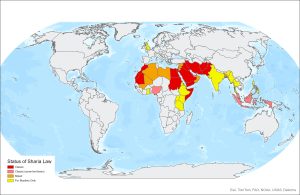67 Doctrine and Ethics
We have already learned a lot about doctrine and ethics in the sections on Cosmology and Narrative. In this section, we take a closer look at how doctrine developed into an ethical system in Islam.
The main source of law and ethics in Islam is from the Quran and the hadith (see Narrative). There is a third source, however, which is not a written text but influences the ethical life of Muslims. This is the Sunna, which means “way of acting.” In Islam, it specifically refers to how Muhammad acted during his life. Although the sunna is not a written text, it is knowledge and understanding of how to be a Muslim based on the accounts of Muhammad in the hadith. Sunna is the remembered custom, habit, and pattern of the behavior of Muhammad. Each person has an internalized understanding of how to live as a Muslim, based on the example of Muhammad. Some Christians use the question, “what would Jesus do?” when confronted with a decision or problem. The Sunna is similar to that practice of consulting your internal understanding of what to do based on the model that Muhammad provides in written texts.
What is Shariah Law?
Islamic Law, or shariah, is based on the idea that God established rules for behavior. These are both negative, as in rules about things people should not do, and positive, as in guidelines for good actions. The literal translation of the Arabic word shariah is “path” or way. It refers to the idea that Shariah provides guidance for living.
Shariah has five categories that indicate positive, neutral, and negative action. Here are the five categories and examples of each one: Positive actions:
- Actions commanded by God (fasting; the five daily prayers)
- Actions recommended by God, but not required (acts of charity beyond the required)
Neutral actions: actions which God has not commanded nor prohibited
Negative Actions:
- actions discouraged by God, for example, divorce
- actions prohibited by God: murder, drinking alcohol, etc.

